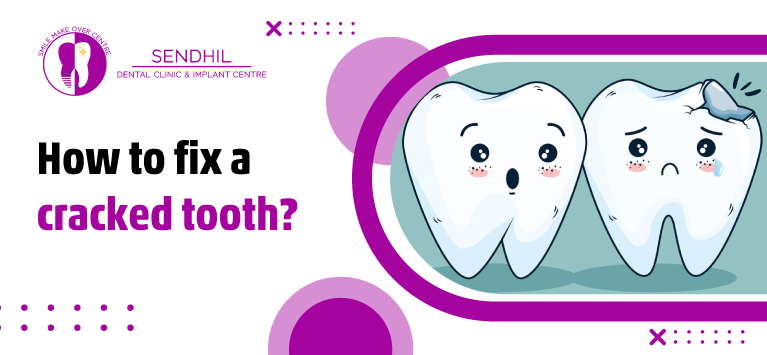
How to fix a cracked tooth?
Have you ever wondered why a cracked tooth might hold such importance? Cracked teeth can be a common dental issue that should not be ignored. If left untreated, a cracked tooth can result in a number of topics. They may result in infections, sensitivity, or even pain.
What causes these cracks specifically, though, and what can you do to stop them? In this blog, we will discuss what a cracked tooth is, how it may affect you, and, importantly, how to fix it.
Table of Contents
What is a Cracked Tooth?
A cracked tooth may also be referred to as a fractured tooth or even a broken tooth. A cracked tooth refers to a tooth that has a visible line or fracture on its surface. It can be a result of various factors such as dental trauma, tooth grinding, biting on complex objects, or a weakened tooth due to a large filling.
Is a Cracked Tooth Serious?
If you don’t take care of your cracked teeth, they might lead to pain, sensitivity, and infections, which makes them quite serious. If the crack extends far into the tooth, it may damage the blood vessels and nerves, needing extensive medical attention.
In addition to making eating difficult and causing pain in your teeth in both hot and cold conditions, not taking care of a broken tooth can lead to the eventual loss of the tooth. Therefore, in order to maintain the health of your mouth and body, it’s critical to address fractured teeth as soon as possible.
Causes of cracked tooth
There are multiple causes of a fractured tooth, including:
1. Teeth grinding (bruxism): Constant grinding or clenching of the teeth can exert excessive pressure on the teeth, leading to cracks over time.
2. Trauma or injury: Cracked teeth can occur from sports injuries, falls, or accidents, mainly if there is a direct hit to the mouth or face.
3. Chewing hard substances: Teeth can fracture as a result of excessive pressure while biting down on hard materials like ice, nuts, hard candies, or pens.
4. Weakened tooth structure: Large fillings, root canal therapy, and significant dental operations can all cause teeth to become structurally weakened and more susceptible to fracturing.
5. Age: Due to years of use and exposure to many circumstances, people’s teeth naturally weaken and become more likely to have cracking as they age.
6. Uneven bite or misaligned teeth: An improper bite can cause an excessive amount of force to be placed on certain teeth, making them more susceptible to cracks.
7. Temperature changes: Sudden changes in temperature in the mouth, such as eating hot food and then immediately drinking cold beverages, can cause the tooth structure to expand and contract quickly, leading to cracks.
It is important to note that sometimes, a broken tooth may not have an apparent cause and can occur spontaneously.
Serious Effects of a Cracked Tooth:
A cracked tooth can lead to the following complications:
- Tooth sensitivity: Cracks can expose the sensitive inner layers of the tooth, causing pain and discomfort when consuming hot or cold food and beverages.
- Tooth decay: Cracks provide an entry point for bacteria, increasing the risk of tooth decay and cavities.
- Gum infection: Bacteria entering through the crack can cause gum infections, leading to swollen and bleeding gums.
Temporary relief ideas for cracked teeth:
Fixing a cracked tooth typically requires professional dental treatment. However, there are steps you can take to temporarily relieve pain and minimize complications before seeing a dentist. Here’s a guide on how to fix fractured tooth:
Rinse your mouth: Gently rinse your mouth with warm saltwater to clean the area and minimize the risk of infection. In a glass of warm water, combine half a teaspoon of salt and swish it about your mouth for around 30 seconds before spitting it out.
Over-the-counter pain relief: If you experience discomfort, you can take over-the-counter pain medications to help manage the pain. Pay attention to the suggested dosage guidelines printed on the container.
Avoid certain foods and drinks: To prevent further damage or pain, avoid chewing on the side of your mouth with the broken tooth. Refrain from consuming hard or sticky foods, as they can make the crack worse.
Dental wax: You can apply dental wax (available at most drugstores) to cover any sharp edges of the tooth, providing temporary relief until you visit the dentist.
Ice pack: Applying an ice pack or cold compress to the affected area on your cheek or lips can help reduce swelling and numb the pain.
Promptly visiting the dentist is a crucial step in fixing a cracked tooth to make an appointment with a dentist as soon as possible. They will accurately diagnose and recommend the appropriate treatment based on the severity and location of the crack. Treatments can include bonding, dental crowns, root canals, or tooth extraction, depending on the extent of the damage.
How to Fix a Cracked Tooth Permanently?
The appropriate treatment for a broken tooth depends on the severity of the crack. The following are commonly used dental interventions:
Dental bonding
For minor cracks, your dentist may apply a tooth-coloured resin to bond the tooth, restoring its shape and function.
Dental crown
A dental crown is recommended for moderate to severe cracks. It involves placing a cap over the fractured tooth, providing support and protection.
Root canal therapy
In cases where the crack has reached the tooth’s pulp, a root canal may be necessary. This involves removing the damaged pulp, cleaning the root canal, and sealing it.
Tooth extraction
In rare cases where the tooth is severely damaged and cannot be saved, extraction may be the only option. The extracted tooth can then be replaced with a dental bridge, implant, or denture.
Winding Up:
In summary, it is important to treat broken tooth seriously. A number of things, including ageing, trauma, and tooth grinding, can cause them. They can cause significant issues, including gum disease and tooth decay if they are not treated. But fractured tooth can be efficiently treated with timely dental care and appropriate procedures like bonding, crowns, or root canals, guaranteeing a pain-free, healthy smile for years to come. So, don’t delay in seeking professional help if you suspect you have a cracked tooth.




